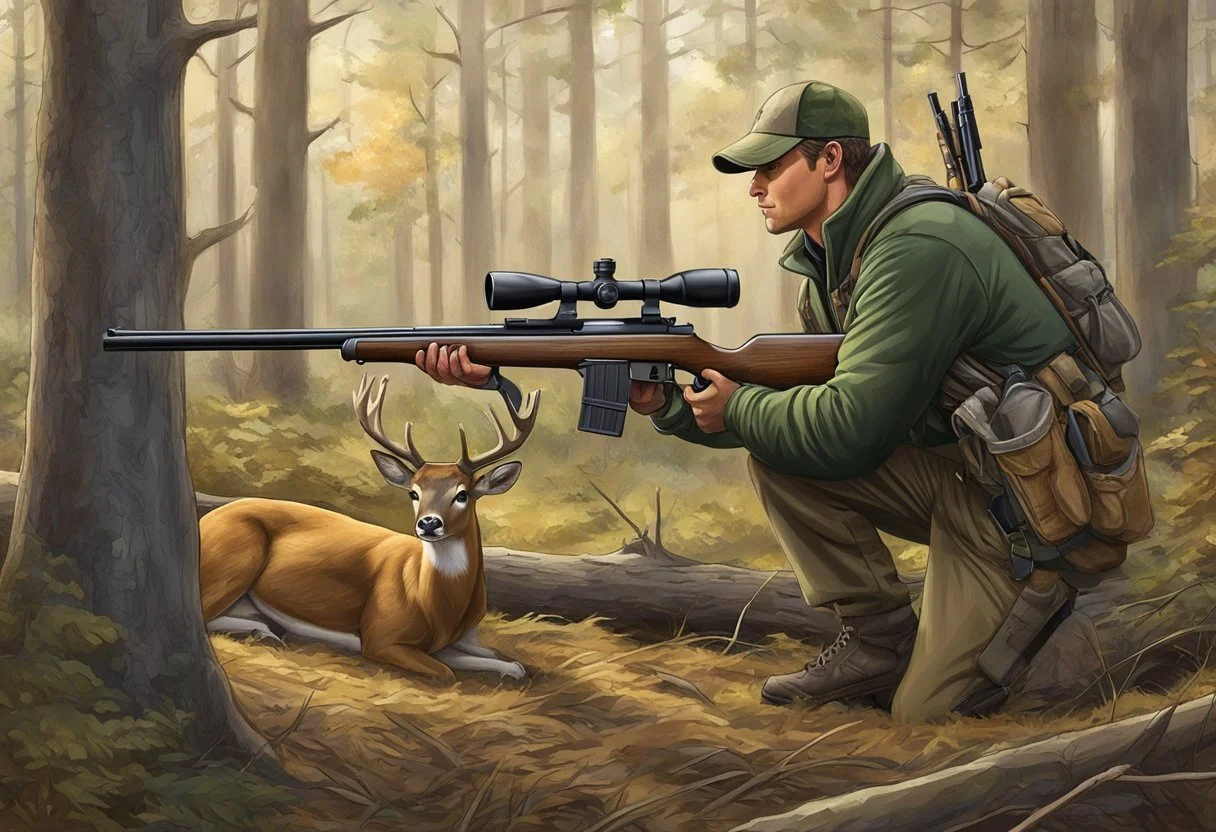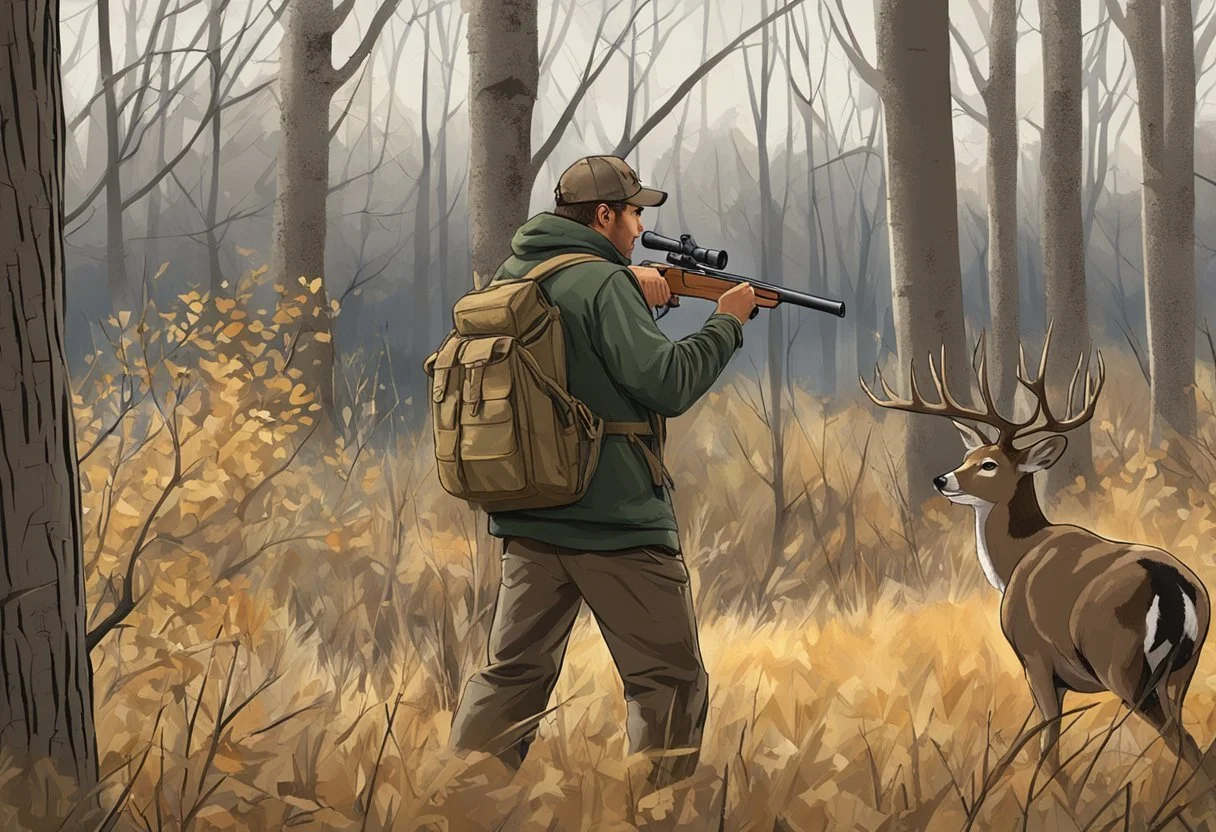Your Guide to Hunting in Illinois
Essential Tips and Regulations
This Article is Part of Our Hunting Guide for All 50 US-States
Illinois provides a diverse landscape and abundant wildlife, making it an ideal destination for hunters at all experience levels. Whether you're new to the sport or looking to expand your hunting area, the Prairie State can offer a satisfying challenge. This article will help beginner hunters in Illinois understand the basics, making it easier to plan a safe and successful trip.
One of the most important aspects for beginners to understand is the hunting regulations and requirements in Illinois. Obtaining a valid hunting license, adhering to guidelines, and respecting hunting seasons are crucial elements in promoting conservation and ethical hunting. Familiarizing yourself with the Illinois Department of Natural Resources' resources will ensure that your experience aligns with state guidelines.
Aside from regulations, novice hunters in Illinois should be well-equipped and knowledgeable about their gear. Learning about the proper clothing, footwear, and other essential hunting tools, as well as the appropriate firearm, ammunition, and techniques for your chosen game, will contribute to a more enjoyable experience. As you continue reading this article, you'll find helpful guidance on various aspects of hunting, from local wildlife to scouting tips and more.
Understanding Hunting in Illinois
Legal Requirements and Regulations
In Illinois, hunters must follow specific legal requirements and abide by the hunting laws set forth by the state. Before heading out for a hunt, it's crucial to familiarize yourself with the latest version of the Illinois Digest of Hunting and Trapping Regulations. This guide is usually published annually and can be found on the Illinois Department of Natural Resources (IDNR) website or at various authorized outlets.
Some key regulations include hunting during designated seasons and being aware of any location-specific restrictions. Additionally, hunters must understand the laws regarding the species being hunted, weapon usage, and any necessary permits.
Hunting Licenses in Illinois
To legally hunt in Illinois, hunters must acquire the appropriate hunting license. Licenses are available for both residents and non-residents, with different fees and requirements for each. They can be purchased through the IDNR website, select retailers, or various IDNR offices.
License Type Resident Non-Resident Youth $7.00 $37.75 Adult $12.50 $57.75 Senior $6.50 N/A
Youth: Ages 16-17, Adult: Ages 18-64, Senior: Age 65 and older
Hunters must carry their licenses and any necessary permits with them while hunting and must be ready to present them if requested by an IDNR representative or law enforcement officer.
Overview of Illinois Department of Natural Resources (IDNR)
The Illinois Department of Natural Resources (IDNR) is the primary government agency responsible for managing and protecting the state's natural resources, including wildlife and their habitats. The IDNR regulates hunting activities throughout Illinois to ensure safety and sustainability.
The IDNR is tasked with enforcing hunting and trapping regulations, monitoring wildlife populations, and providing education programs to promote responsible hunting practices. They also maintain various public hunting areas throughout Illinois, providing hunters with abundant opportunities to pursue their favorite game.
For beginners and experienced hunters alike, understanding the legal requirements, licensing procedures, and role of the IDNR is an essential part of responsible and ethical hunting in Illinois. Ensuring you are up to date with current laws and regulations will not only keep you in compliance but also help preserve the state's precious natural resources for future generations of hunters to enjoy.
Preparation for Hunting
Choosing the Appropriate Gear
Proper gear is essential for a successful and safe hunting experience. Start by selecting appropriate clothing, such as camouflage outfits that blend with your surroundings and lightweight, moisture-wicking layers underneath. Additionally, invest in a good pair of hunting boots that offer comfort, support, and protection from the elements.
A few additional items to consider when selecting your gear:
A comfortable hunting backpack to carry essentials
Scent-control products to minimize your odor and avoid spooking wildlife
Basic survival items, including a first-aid kit, water, and a map
Remember, the right gear can make all the difference in your hunting experience.
Wildlife Management and Conservation
Being a responsible hunter means supporting wildlife management and conservation efforts. Familiarize yourself with local hunting regulations and ensure you have the proper licenses and tags in place. Engage in ethical hunting practices, including:
Only targeting animals within an appropriate age and size range to maintain population stability
Avoiding the trapping of non-target species
Leaving no waste behind in the field and disposing of leftover materials responsibly
Selecting the Right Weapon
Your choice of weapon depends on the game, local regulations, and personal preferences. Let's explore the two main options: firearms and bows.
Firearms:
Rifles: A popular choice for hunting medium to large game, offering accuracy and power. When choosing a rifle, consider a centerfire model, as it typically provides more power and versatility.
Caliber Suitable for .243 Win Deer, antelope .30-06 Deer, elk, moose
Shotguns: Ideal for small game and birds. Shotguns typically offer a shorter range compared to rifles, but have a wider shot pattern, making it easier to hit moving targets.
Bows:
Compound bows: These have a system of cams and pulleys, making them easier to draw and hold. Compound bows are excellent for beginners.
Recurve bows: Traditional-style bows with a simple design and a smooth draw. They could be harder for beginners but provide a more traditional hunting experience.
Choose your hunting weapon based on the kind of game you seek, the local regulations, and your personal comfort. Whether using a rifle, shotgun, or bow, always prioritize safety and practice your skills to improve accuracy and effectiveness.
Types of Hunting
Deer Hunting Basics
Deer hunting in Illinois is a popular activity for both beginners and seasoned hunters. The two primary methods for harvesting deer are using a rifle or a bow. When choosing a firearm for deer hunting, beginners often opt for single-shot rifles, as they offer simplicity and encourage careful shot selection.
Hunters can participate in various seasons, such as archery, firearm, and muzzleloader seasons. It's crucial to understand the regulations, license requirements, and bag limits associated with each season. To maximize the chances of success, hunters should locate feeding and bedding areas, scout for deer sign, and use scent control practices. Additionally, practicing safety measures, like wearing blaze orange clothing, is key in preventing mishaps during the hunt.
Waterfowl Hunting Overview
Waterfowl hunting in Illinois typically targets ducks (What wine goes well with duck?) and geese. This type of hunting usually takes place near bodies of water, such as lakes, rivers, and wetlands. Consequently, waterfowl hunters will often use boats, blinds, and decoys to help them approach and lure the birds within shooting range.
Shotguns are the preferred firearm for waterfowl hunting, with steel or non-toxic shot required by law. There are several shotgun types available, including pump-action, semi-automatic, and over-and-under models, each with its pros and cons.
To get started in waterfowl hunting, one should be familiar with these essential items:
Waterfowl license and stamps: Acquiring the appropriate state and federal waterfowl stamps are mandatory.
Decoys: A variety of duck and goose decoys will help lure the birds closer.
Camouflage: Blinds and camouflage clothing will keep you hidden from the birds' sharp eyesight.
Calling: Mastering the art of using duck and goose calls can significantly increase your chances of attracting waterfowl.
Turkey Hunting for Beginners
Turkey hunting is another popular game pursuit in Illinois, mainly focusing on the Eastern Wild Turkey. Beginners should familiarize themselves with key aspects related to turkey (What wine goes well with turkey?) hunting, such as habitat, behavior, calling techniques, and regulations.
Archery and shotgun are the two primary weapon choices for turkey hunting. Bowhunters should ensure they use broadheads specifically designed for turkeys, while shotgun hunters should select the right shot size and choke for success.
Here are a few tips for beginner turkey hunters:
Camouflage: Turkeys have keen eyesight, so full camouflage attire, including gloves and a face mask, is essential.
Scouting: Locate roosting sites, feeding areas, and travel corridors to help increase your chances of encountering a turkey.
Calling: Practice different types and styles of turkey calls, including box calls, mouth calls, and slate calls, to effectively lure turkeys in.
Patience: Turkey hunting requires patience and persistence, as these elusive birds can be quite challenging to locate and approach.
Hunting Techniques and Strategies
Rifle Hunting Methods
When it comes to rifle hunting in Illinois, there are a few strategies that beginners can use for optimal success. Stalking is one popular method, which involves moving slowly and stealthily through the woods to locate prey. Utilize single-shot rifles for a more challenging and rewarding experience.
Ambush hunting, another method, involves waiting patiently in a predetermined location, such as near a food source, water source, or trail. Identify where animals are most likely to pass by and set up a tree stand or ground blind to stay concealed. Use scent control techniques, such as scent-masking sprays and scent-absorbing clothing, to minimize detection.
Bowhunting Techniques
Bowhunting brings its own unique challenges and techniques to master. The most important aspect of bowhunting is accuracy, as the effective range of bows is shorter than that of rifles. Practice regularly to improve your skills. Here are a few key tips for successful bowhunting:
Shot placement: Aim for the vital organs, such as the heart or lungs, for an ethical and efficient kill.
Patience: Wait for the perfect shot opportunity before taking aim, ensuring a clean and effective harvest.
Camouflage: Blend into your surroundings to avoid detection and spooking your prey.
Approaches to Trapping
For those interested in trapping, Illinois offers a diverse range of targets, from small game to fur-bearing species. Implementing different types of traps can increase your chances of success:
Trap Type Target Species Tips Foothold Fox, Coyote, Raccoon Opt for a well-built and durable trap Body Grip Beaver, Muskrat Place near the entrance of burrows or dens Cage Trap Opossum, Skunk Use baits and lures to attract your target
Check traps daily, as required by Illinois law, and use best practices for humane trapping methods. Don't forget to always follow state guidelines, obtain required permits, and adhere to trapping season dates. Trapping takes patience and persistence, but it can be a rewarding pursuit worth mastering.
Safety and Ethical Considerations
Hunting Safety Guidelines
Before going on a hunt, it is crucial for hunters to follow safety guidelines to protect themselves and others.
Properly handle weapons: It is important to treat every firearm as if it is loaded and never point its muzzle at anything you do not intend to shoot. Keep your finger off the trigger until ready to shoot.
Wear proper attire: High-visibility orange clothing should be worn to make yourself easily visible to other hunters in the area.
Know your target and what lies beyond: Ensure that you have a clear, safe shot before pulling the trigger, taking into account what is behind your target.
Equip yourself with safety gear: Items such as tree stands, safety harnesses, and protective eyewear should be used whenever appropriate.
Adherence to these guidelines helps to ensure a safe and enjoyable hunting experience in Illinois.
Ethical Hunting Practices
In addition to safety measures, ethical hunting practices should be considered when hunting in Illinois. These practices help to preserve wildlife populations and maintain a responsible hunting culture.
Follow all laws and regulations: Ensure that you obtain the proper hunting licenses and adhere to all relevant hunting laws, including weapon restrictions and bag limits.
Respect private property: Always obtain permission from landowners before hunting on private land, and be respectful of property boundaries while hunting.
Practice fair chase: Hunt in a way that gives wildlife an equal opportunity to escape, avoiding the use of technological advantages or hunting methods that violate fair chase principles.
Show consideration for other hunters: Avoid disrupting the hunting experience of others and respect the rights and perspectives of fellow hunters.
Utilize harvested game: Make every effort to use as much of the harvested game as possible, including meat, hide, and antlers.
By following these ethical hunting practices, hunters can contribute to the sustainable management of wildlife resources and maintain a positive image of the hunting community in Illinois.
Hunting Seasons and Bag Limits
Understanding the Hunting Calendar
The hunting calendar in Illinois is divided into different seasons for various species. These seasons are established to manage wildlife populations effectively and ensure responsible hunting practices. Familiarizing yourself with the hunting calendar and understanding bag limits are crucial for any beginner hunter in Illinois.
Some essential elements to consider include:
Different seasons for specific species like deer, turkey, and ducks
Designated central zones for waterfowl hunting
Daily and total bag limits for each species
Stay up-to-date with the current hunting seasons by consulting the Illinois Department of Natural Resources (IDNR) website or obtaining a copy of the latest hunting regulations booklet.
Species-Specific Seasons and Restrictions
Deer: Illinois offers both firearm and archery deer hunting seasons. Firearm seasons usually take place during November and December, while archery runs from October through mid-January. Please note that specific dates may vary annually.
Season Dates Firearm Mid-November and Early December Archery October to Mid-January
Waterfowl Hunting: Hunting ducks, geese, and other migratory birds is regulated by both state and federal laws. The waterfowl hunting seasons are divided into zones, with the central zone being one of the primary areas in Illinois.
Zone Dates Central Typically late October to January
Be sure to follow all necessary permit requirements, zone designations, hunting hours, and bag limits when engaging in waterfowl hunting. These details can also be found on the IDNR website.
Turkey: Spring and fall hunting seasons are available for wild turkey in Illinois. Spring hunting typically runs from early April to mid-May, while fall seasons span from mid-October to mid-January (archery) or late October to early December (firearm).
Season Dates Spring Early April to Mid-May Fall Mid-October to Early December
Bag Limits: Bag limits are established to ensure sustainable wildlife populations and responsible hunting practices. These limits vary based on the species and time of year. Daily bag limits are the maximum number of animals you can take in one day, whereas total or possession limits indicate the maximum number allowed over the entire season.
Species Bag Limit Example Deer One antlered deer per firearm season Ducks Six ducks daily, eighteen in possession Turkey One bearded turkey per season (spring)
Keep in mind that bag limit details may change, so always consult the most up-to-date regulations before heading out to hunt. By understanding and respecting the hunting seasons, central zones, and bag limits, beginner hunters in Illinois can enjoy a responsible and successful hunting experience.
After the Hunt
Processing Game
Once the hunt is over, processing the game is an essential step. In Illinois, first-time hunters must familiarize themselves with the proper methods of field dressing, skinning, and butchering.
Field Dressing: Carefully remove the animal's internal organs to preserve the meat and avoid spoilage. This should be done as soon as possible after the kill.
Skinning: Remove the animal's hide, being cautious not to damage the meat underneath.
Butchering: Separate the meat into different cuts, such as backstrap, tenderloin, and shoulders, depending on your preferences and the animal you are hunting.
During this process, always maintain cleanliness and practice safety measures to ensure the highest quality meat.
Hunting Events and Activities
There are various events and activities available for beginner hunters in Illinois to build their skills and participate in the hunting community. Some popular options include:
Sportsmen's Clubs: Joining a local sportsmen's club can be an excellent opportunity to connect with experienced hunters, practice skills, and learn about hunting etiquette.
Competitions: Participating in shooting competitions, such as skeet, trap, or sporting clays, helps sharpen accuracy and build confidence in the field.
Hunter's Education Courses: Illinois offers both online and in-person courses to educate beginners on hunting safety, laws, and ethics.
Family Hunts: Experienced hunters often organize family hunts, providing a perfect occasion for beginners to gain first-hand experience under the guidance of seasoned hunters.
By engaging in these events and activities, new hunters can steadily improve their skills, make valuable connections within the hunting community, and ensure a rewarding experience.





